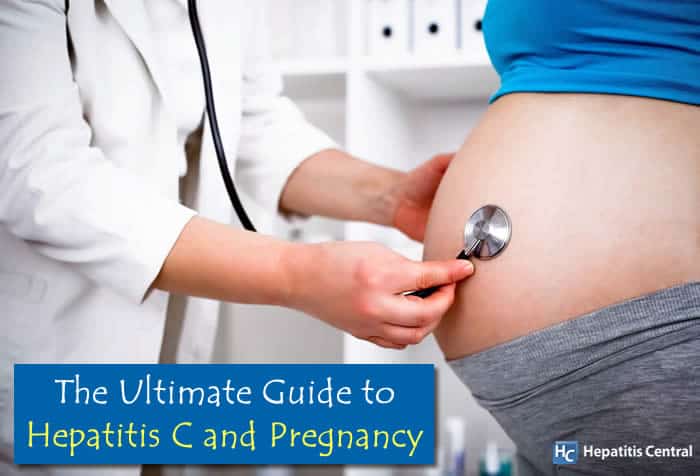The Ultimate Guide to Hepatitis C and Pregnancy


Pregnancy can be an extremely overwhelming period for everyone involved. The physical and psychological strain is heavy, but so is the seemingly endless flow of advice from all corners of your life including family, friends, books, TV, and the internet.
And, yet, information about the hepatitis C virus (HCV) and pregnancy is significantly less than bountiful, and the overlap between the two presents a relative vacuum of information up until recently.
According to the Society for Maternal-Fetal Medicine, “1-2.5% of pregnant women are infected with the hepatitis C virus,” and on a worldwide stage, that number grows to roughly 8% of pregnant women who have HCV (1). On a domestic level, the prevalence of HCV among pregnant women is growing. HCV is the precursor to liver disease, so it’s no surprise that the call for hepatitis C treatment information for pregnant women has slowly grown to a fever pitch over the last decade.
Now, with new studies and articles examining the relationship between pregnancy and HCV being published every month, it feels like the appropriate moment to assemble a current guide for navigating the growing Venn diagram that is HCV and pregnancy.

Hepatitis C Basics
What makes HCV tricky for women and pregnancy is how long it takes symptoms to manifest. This is why it’s so important to get screened by your doctor or gynecologist regularly, and not just when pregnancy occurs.
Hep C is broken into two main forms: acute and chronic.
Acute infection is how HCV starts, defined as the first 6 months after exposure occurs. Unfortunately, it’s usually asymptomatic and, when symptoms do occur, they manifest as more benign ailments like abdominal pains, nausea, or malaise, which often gets ignored. Luckily, it’s estimated that roughly 45% of infected individuals spontaneously clear HCV within 6 months many without treatment (2).
But if one doesn’t clear HCV within that time, it becomes chronic. Chronic hepatitis C can lead to liver cancer, liver damage and, ultimately, liver failure.
Testing and detection at the prenatal stage are critical and highly recommended by the Infectious Diseases Society of America and the American Association for the Study of Liver Diseases (2). Earlier detection increases opportunities for education, gathering proper referrals, as well as time for the appropriate tests and care during and after pregnancy (2).
Transmission to Children
If you are pregnant and have hep C, The American College of Obstetricians and Gynecologists found that there is roughly a 5% chance of transmission from mother to infant (2). While that is a relatively low percentage, it’s still scary nonetheless, especially when piled onto all the other probabilities of various complications looming over pregnancy.
Unfortunately, vertical transmission of hepatitis C from mother to child is the leading cause of HCV infection in kids. But because of the societal stigma and general lack of education surrounding children and HCV, it’s important to remember that in the absence of direct blood exposure, it’s non-transmittable from casual contact, and disclosure of anyone’s HCV infection status, especially children, should not never be required and children should never be restricted from any space or activity based on their HCV status.
Hepatitis C vs. Hepatitis E
When it comes to pregnancy and what the worst kind of hepatitis is, the answer is hepatitis E (4).
In the Official Publication of the College of Family Physicians of Canada, hepatitis E in pregnancy, “especially in the third trimester, is characterized by a more severe infection that sometimes results in fulminant hepatitis, increasing maternal and fetal mortality and morbidity.”
Be especially concerned about hepatitis E if traveling abroad to Southeast Asia, where hepatitis E is commonly a “water-borne pathogen transmitted by the fecal-oral route (4).”
Treatment of HCV During Pregnancy and Beyond
The need for more research in this area is obvious judging by the current recommendation from medical experts which calls for screening as soon as prenatal care begins, but offers no treatment options for HCV during pregnancy due to lack of research regarding how antiviral mediations interact with pregnancy.
That was until a recent Pilot Study out of Seattle headed by Catherine A. Chappell, MD, MSc. Chappel’s aim was to assess the antiviral response in pregnant women to a 12-week course of 90mg of ledipasvir and 400mg of sofosbuvir (LDV/SOF) (5).
The study followed patients postpartum and is monitoring children for the first year after birth. The results were very promising with Chappell finding “that all patients had a rapid response to therapy and achieved sustained virologic response 12 weeks after therapy (5).”
This is definitely an encouraging step, but more research is needed.
Hep C Treatment for Children
According to the Hepatitis Trust, children and babies born with hepatitis may have a difficult time getting antiviral treatments until they become adults. Unfortunately, children currently only have access to peg-interferon and ribavirin antiviral treatments. These aren’t the best options for children given the laundry list of side-effects (6).
In the meantime, it’s important for parents of children with HCV to help protect their children’s livers by keeping their diets free of things that can cause hepatic inflammation, such as sugar and saturated fats. These foods can be extremely difficult for our livers to process and eliminating them from the diet can lighten the load.
Sticking to all-natural and plant-based diets will set you up for the most success when it comes to managing your child’s HCV symptoms and getting the nutrition you need.
However, bolstering liver strength with supplements is also an effective way to ensure children are getting the nutrients they need to manage their infection. Supplements can often be managed easier than foods, especially when one of the symptoms of HCV is nausea and lack of appetite, which can create a negative spiral of not eating, which leads to not getting the necessary nutrients and, ultimately, exacerbates HCV symptoms.
Breastfeeding
Breastfeeding is another issue that comes up when discussing HCV. Leading research suggests breastfeeding is completely safe in HCV-positive mothers and doesn’t look like it affects the risk of vertical transmission of HCV from mother to child (1). Although, if you have cracked or bleeding nipples, it is recommended to abstain from breastfeeding (1).
Getting Pregnant After Antiviral Treatment
Leading medical advice tells us to make sure we’re 6 months past any antiviral treatment such as ribavirin and pro-interferon (7). Taking either within the 6-month window of becoming pregnant does significantly increase the risk of birth defects (7).
Main Takeaways
The most important things to remember are to:
- Screen often and get as much information as you can. Always consult your doctor and/or OBGYN when it comes to getting pregnant with HCV – especially if antiviral treatment is on the table.
- Get tested if you just learned of your pregnancy and request to be screened for HCV as early into beginning prenatal care as possible.
While this field is in desperate need of more research we’re positive that the spotlight is turning to HCV and pregnancy and we’ll be seeing more literature emerge in the coming months and years.
- Hughes, B. L., MD, Page, C. M., MD, & Kuller, J. A., MD. (2017, July 31). Hepatitis C in pregnancy: Screening, treatment, and management. Retrieved July 12, 2019, from https://www.ajog.org/article/S0002-9378(17)30930-4/pdf Published by Elsevier Inc. All rights reserved
- HCV in Pregnancy: HCV Guidance. (2018, May 24). Retrieved July 17, 2019, from https://www.hcvguidelines.org/unique-populations/pregnancy Copyright © 2014-2019 by the American Association for the Study of Liver Diseases and the Infectious Diseases Society of America. All rights reserved.
- Kushner, T., & Terrault, N. A. (2018, November 30). Hepatitis C in Pregnancy: A Unique Opportunity to Improve the Hepatitis C Cascade of Care. Retrieved July 17, 2019, from https://www.ncbi.nlm.nih.gov/pmc/articles/PMC6312659/ Articles from Hepatology Communications are provided here courtesy of Wiley-Blackwell
- Chaudhry, S. A., Verma, N., & Koren, G. (2015, July). Hepatitis E infection during pregnancy. Retrieved July 17, 2019, from https://www.ncbi.nlm.nih.gov/pmc/articles/PMC4501603/ Articles from Canadian Family Physician are provided here courtesy of College of Family Physicians of Canada
- Chappell, C. A. (2019, March 8). Pilot study finds HCV treatment safe in pregnancy. Retrieved July 18, 2019, from https://www.healio.com/infectious-disease/hepatitis-c/news/online/{6d051c59-4333-4d1e-9f4c-ae9185ac4a79}/pilot-study-finds-hcv-treatment-safe-in-pregnancy Published by Healio All Rights Reserved.
- Information on children and hepatitis C. (n.d.). Retrieved July 18, 2019, from http://www.hepctrust.org.uk/information/living-hepatitis-c/hepatitis-c-and-children ©2019 Hepatitis C Trust
- Porter, L. K. (2019, April 22). I completed hepatitis C treatment and I'd like to get pregnant. Do hep C drugs affect pregnancy, delivery or the baby? Retrieved July 18, 2019, from https://www.hepmag.com/article/completed-hepatitis-c-treatment-like-get-pregnant-hep-c-drugs-affect-pregnancy-delivery-baby






